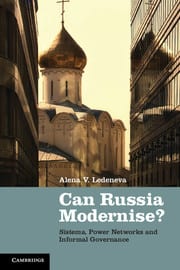Can Russia Modernise? An economist’s perspective
By Sean L Hanley, on 20 March 2014
I n her 2013 book Can Russia Modernise? Alena Ledeneva picked out key types of networks that make up Sistema: Russia’s complex, ambiguous and sometimes surprisingly effective systems of informal governance. In the last contribution to a ‘mini-symposium’ Theocharis Grigoriadis assesses the book’s arguments from an economist’s perspective, suggesting that Ledeneva understands the durability of sistema as a series of trade-offs that reduce collective welfare.
n her 2013 book Can Russia Modernise? Alena Ledeneva picked out key types of networks that make up Sistema: Russia’s complex, ambiguous and sometimes surprisingly effective systems of informal governance. In the last contribution to a ‘mini-symposium’ Theocharis Grigoriadis assesses the book’s arguments from an economist’s perspective, suggesting that Ledeneva understands the durability of sistema as a series of trade-offs that reduce collective welfare.
In her seminal book on informal politics and governance in post-Soviet Russia, Can Russia Modernise? Sistema, Power Networks, and Informal Governance , Alena Ledeneva puts forward a theory of networked governance that relativises the significance of formalised vertical structures and hierarchical decision-making for understanding Russian politics.
Ledeneva’s theory makes a unique contribution to political science and sociology and deals with following themes in relation to Russian politics and society:
- Continuities of power networks under central planning and capitalism;
- Sistema as a form of networked governance in authoritarian regimes;
- The transformation of the St. Petersburg circle into the inner sistema of Russian politics;
- The prospects for societal modernisation under Putin.
While blat networks in socialism facilitated the provision of consumer goods circumventing the formal absence of marketplaces, power networks in post-socialism involved the provision of public goods such as security, justice, and healthcare. The author suggests that market transitions in the former Soviet Union preserved more elements from the economic organization of central planning than we might want to admit, both in terms of people in power and economic practices.
As Ledeneva argues, the analysis of informal networks matters, because it is essential to trace the effects of friendships and close relationships on ministerial appointments, judicial decisions and corporate deals. The identification of their existence per se has major theoretical significance, but does not explain current developments in Russian politics. Ledeneva suggests that while continuities in networked governance between socialism and post-socialism exist, what differentiates Putin’s Russia is the even wider spread of informal rules and even higher informational asymmetry between those insider and those outsider a power network. In this sense, Putin’s sistema is at least partially – if not fully – a reversion to the Soviet status quo ante.
The Russian sistema is a set of public and private networks that manages public wealth and delivers public goods, thus determining the magnitude of its members’ rent-seeking strategies. While the sistema combines both public and private elements in its enforcement strategies, the hierarchical predominance of public over private interests and institutions is indisputable.
This is how, according to Ledeneva, Putin’s sistema has redefined the Russian public domain. (more…)
 Close
Close


